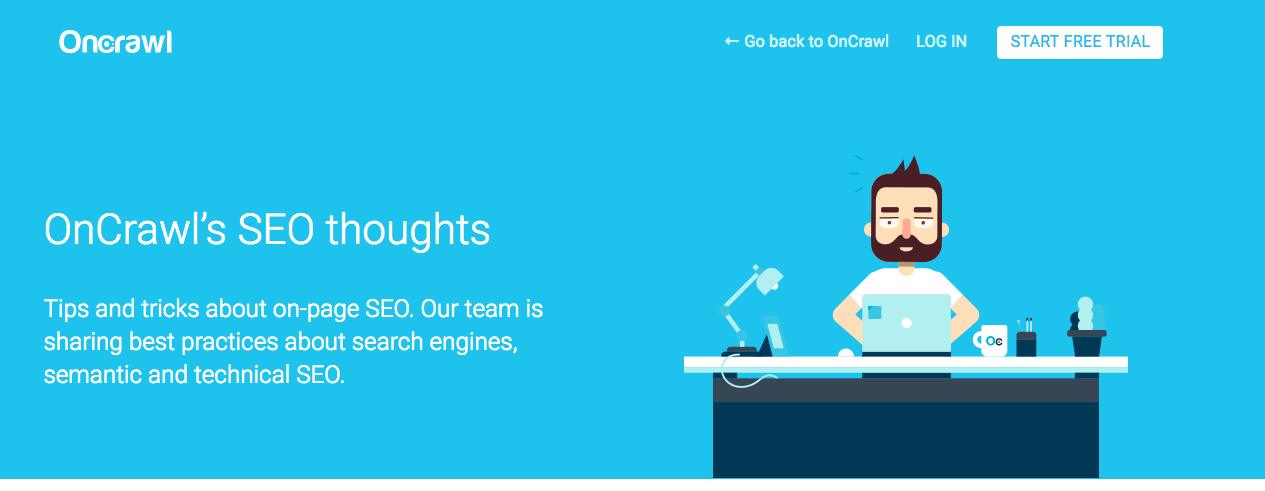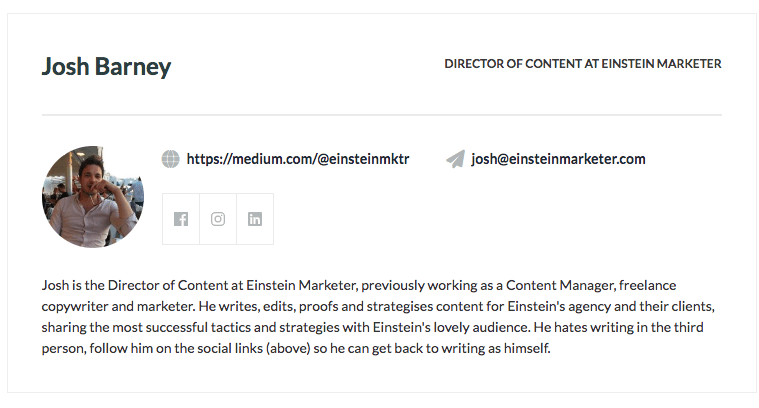Guest blogging is a useful tactic to get your content published and build yourself a name in the digital marketing industry.
But before pitching anything to a blog editor, you need to know exactly what kind of content they are after — that’s guest blogging 101.
Their areas of interest and their editorial standards will help you decide what content to offer them.
To help you save time on assessing your “targets”, I made a list of the 20 most popular digital marketing media that accept guest posts with quick tips about what content they prefer and how to approach them.
So, what posts do they usually publish?
What Type of Content About Digital Marketing Usually Gets Published
From what I’ve seen over the years working in digital marketing, most of the posts fall under one of the following categories (if we don’t consider news):
- “Nothing new”: This type of content is not necessarily of little value or involves plagiarism. Roundups, reviews, summaries — they all belong to this tier and add up value to initial materials, however, the majority of content is just the retelling of the same old story. The only thing that differentiates such posts from one another is how well they are written in terms of style and structure. So, if you need to publish a story on a not-so-fresh topic, pay special attention to the way it’s written.
- A fresh perspective / an expert opinion on the subject: If you find an expert ready to give you a quote for a “nothing new” post, it increases its chances of being accepted to a top-tier media.
- Case studies: Nothing grabs as much attention as a personal story. In fact, there are media that specialize on posting case studies mainly because of their high engagement potential. If it also contains a unique strategy, a new approach or angle, it has really good chances of being accepted by a prestigious blog. Personally, I hate writing about something that I’ve already read/written about before, so that’s why I often go with this option.
- Research: This type of content is hard to create but easy to pitch. Given that it’s well written, illustrative, and provides interesting conclusions, it has a pretty high chance of being accepted by a top-tier media.
Any content you decide to create should be of the highest quality possible. So pick wisely.
But if, for example, you can’t invest too much time in a research or do not have enough information for a compelling case study, it’s totally all right.
A nice roundup or an informative infographic will always be appreciated.
What really matters is how well it’s executed and how it fits the blog’s area of interest.
Below you will find the list of the popular digital marketing blogs and a few tips on how to pitch your story to them.
20 Blogs That Accept Guest Posts About Digital Marketing
1. Learn Inbound
What they want: Posts about everything inbound marketing.
Hint: Review their line-up and suggest a topic based on what the invited speakers are going to talk about. You can also ask a speaker to participate in the creation of your content (e.g., give you a quote).
2. OnCrawl
What they want: These guys write about technical SEO like crawl budgets and site speed optimization. So if you know a thing in technical SEO, then this is a great place to pitch your post to.
Hint: Emma Labrador will be the right person to talk about a guest post contribution.

3. Ryte
What they want: In-depth how-tos that share practical advice. Ryte prioritizes reader’s value, so the post you submit should cover the topic comprehensively.
Hint: You can pitch your post to Ryte.com here.
4. SEMrush
What they want: SEMrush is a comprehensive toolkit for digital marketers, but they also have a popular blog where they (and many of their guest authors) write about search, PPC, digital PR, and everything digital marketing. SEMrush has pretty strict editorial guidelines, which is convenient since you don’t have to wait for clarifications to start working on a post.
Hint: You can submit your post directly on their site, but I recommend to connect with their blog editor before sending your post.
5. Moz
What they want: As one of the most popular blogs in digital marketing, Moz prefers original content with a unique perspective and obvious value to the reader. That’s why they favor how-tos, research, and case studies.
Hint: If you have enough resources, then a research will be your winning horse. That’s what I did a few years ago.
6. Business 2 Community
What they want: Business2Community likes things that are newsworthy. For instance, your thoughts on a new Twitter feature or an update to Facebook Ads.
Hint: They always ask to share the previous samples of your work, so be ready to provide a portfolio.
7. RankWatch
What they want: Any topic within SEO domain is a good match. In their guidelines, they emphasize content interactivity and advise to add links, pictures, infographics, statistics etc.
Hint: Integrating Rankwatch tool into your post and cross-linking it with other posts on their blog will help you gain their favor.
8. SERPstat
What they want: SERPstat are growing their community, so they will be interested in materials that will help them connect with other influencers. So posts with the quotes from experts will be favored here.
Hint: For your collaboration to be mutually beneficial, you’ll have to be willing to give something in return. For example, help the guys with their social media, pay attention to what they share. Only after that it makes sense to start pitching.
9. HubSpot
What they want: Anything related to running a digital marketing agency.
Hint: HubSpot is not so easy to approach, so unleash your creativity. For example, create a video with your pitch and run ads on HubSpot employees on Facebook.

10. Blogging Wizard
What they want: Guides and how-tos should work. For example, topics like “How to speed up your SEO with PPC” can often be seen there.
Hint: Adam Connell will be the right person to talk about your next guest contribution.
11. Ahrefs
What they want: Ahrefs has a popular blog, so they are selective about what they publish. That means 100 percent original copy, unique strategies, and practical angles. If you’re a fan of the tool, your chances of being accepted are even higher.
Hint: Cold pitching will hardly get you a spot on their editorial calendar. With a blog like this, you’ll have to build a relationship first, starting with commenting, running discussions on their Facebook group – Ahrefs Insider.
12. Mention
What they want: Mention is a tool for tracking brand mentions, so everything link building is the right direction to take. You can find a lot of info in their guest posting guidelines.
Hint: Instead of writing to a generic email [email protected] you can connect with Mention editor directly on Twitter or LinkedIn.
13. Search Engine People
What they want: Search Engine People is an agency that specializes in SEO, PPC and other areas of digital marketing, so their blog covers a little bit of everything in the industry.
Hint: You can submit your post directly on the page with their editorial guidelines. To grasp their attention, you have to make sure your post stands out: a catchy title, clear structure, and brainstorm a good topic.
14. Jeff Bullas’s Blog
What they want: Jeff Bullas is interested in 100 percent original material that won’t involve any self-promotion. Also, in the guidelines, they recommend pitching a minimum of three topics. This increases the odds that you’ll be accepted because there are more chances they will like one of your ideas.
Hint: To stand out and increase your chances of receiving a response of “yes, we’re interested in your topic”, I recommend brainstorming creative titles. For instance, one of their posts is named as “How To Jazz Up Your Emails With Rich Media (Inspiration From Brands That Are Nailing It)” which perfectly describes my idea of using creativity in your post subject line.
15. Shane Barker
What they want: Shane Barker’s blog is about digital marketing, with a focus on SEO and influencer marketing. If written well, a post on anything around these topics should be a good fit.
Hint: Barker does regular roundups, this might be your chance to get in.
16. BuzzSumo
What they want: BuzzSumo specializes in content marketing, but you can try to squeeze in with an intersection between content marketing and SEO. Link building is also a working topic.
Hint: Susan Moller, BuzzSumo’s blog editor, runs a lovely group on Facebook. However, it’s for ladies only. If you manage to get it, you can try to get in touch and validate a post idea.
17. Einstein Marketer
What they want: SEO and SMM and how they work together. SEO for WordPress will also be a good fit. The blog has guidelines.
Hint: Try sending your pitch directly to Josh Barney.

18. Pitchbox
What they want: As a tool for outreach, Pitchbox writes about link building and outreach tactics.
Hint: Pitchbox is interested in link building, so you’ll have to find a new angle to the old topic. Also, they really care about the quality of the writing, so don’t bother pitching anything that isn’t really exciting.
19. Oribi
What they want: Since Oribi is a tool for interpretation of Google Analytics’ data, topics around data analysis and SEO should work.
Hint: If your topic fits into their area of interest, you’re halfway there. Oribi’s blog is not as unapproachable as big media — they guys are responsive on Twitter, so you can always contact them to clarify their demands.
20. SEO Hacker
What they want: SEO Hacker’s primary audience are upcoming SEO specialists, so your post should be practical and insightful, but easy to grasp.
Hint: As it is with other media, for them to pay attention to you, you need to pay attention to them. For example, follow their founder on Twitter or ask for his quote.
P.S.: I can’t leave without mentioning Search Engine Journal. You can pitch SEJ here.
More Content Marketing Resources:
Image Credits
Featured Image: Created by author, September 2018
All screenshots taken by author, September 2018
Subscribe to SEJ
Get our daily newsletter from SEJ’s Founder Loren Baker about the latest news in the industry!
